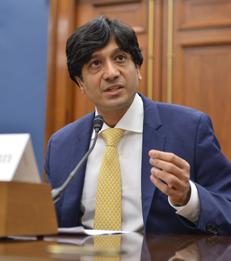Research Highlights
Professor Arun Sundararajan Testifies Before Congress on the Sharing Economy
—


I believe that peer-to-peer business enabled by digital platforms will constitute a significant fraction of the economy in the coming years.
On January 15, NYU Stern Professor Arun Sundararajan, NEC Faculty Fellow and Head of the Social Cities Initiative at NYU’s Center for Urban Science and Progress, testified on the sharing economy, its economic promise, and the regulatory issues faced by peer-to-peer businesses at a hearing convened by the US House of Representatives Committee on Small Business.
Sundararajan said: “I believe that peer-to-peer business enabled by digital platforms will constitute a significant fraction of the economy in the coming years. It is likely that this transition will have a positive impact on economic growth and welfare, by stimulating new consumption, by raising productivity, and by catalyzing individual innovation and entrepreneurship.
Robust measurement of the economic impact of peer-to-peer businesses, and especially small businesses, is important, as is the possible refinement of existing economic measures so that they fully capture new forms of production, consumption and work facilitated by smaller peer-to-peer businesses.
The current regulatory infrastructure can impede the growth of these businesses, in part because of misalignment between newer peer-to-peer business models/roles and older guidelines developed to mitigate safety concerns and economic externalities for the existing ways of providing the same or similar services. A path to lowering these barriers while ensuring that market failure is avoided could be to restructure the regulatory framework to address new issues raised by the expansion of peer-to-peer businesses, delegating more regulatory responsibility to the marketplaces and platforms, while simultaneously preserving some government oversight.”
Read Professor Sundararajan’s complete written testimony.
Watch the full hearing:
Sundararajan said: “I believe that peer-to-peer business enabled by digital platforms will constitute a significant fraction of the economy in the coming years. It is likely that this transition will have a positive impact on economic growth and welfare, by stimulating new consumption, by raising productivity, and by catalyzing individual innovation and entrepreneurship.
Robust measurement of the economic impact of peer-to-peer businesses, and especially small businesses, is important, as is the possible refinement of existing economic measures so that they fully capture new forms of production, consumption and work facilitated by smaller peer-to-peer businesses.
The current regulatory infrastructure can impede the growth of these businesses, in part because of misalignment between newer peer-to-peer business models/roles and older guidelines developed to mitigate safety concerns and economic externalities for the existing ways of providing the same or similar services. A path to lowering these barriers while ensuring that market failure is avoided could be to restructure the regulatory framework to address new issues raised by the expansion of peer-to-peer businesses, delegating more regulatory responsibility to the marketplaces and platforms, while simultaneously preserving some government oversight.”
Read Professor Sundararajan’s complete written testimony.
Watch the full hearing:
